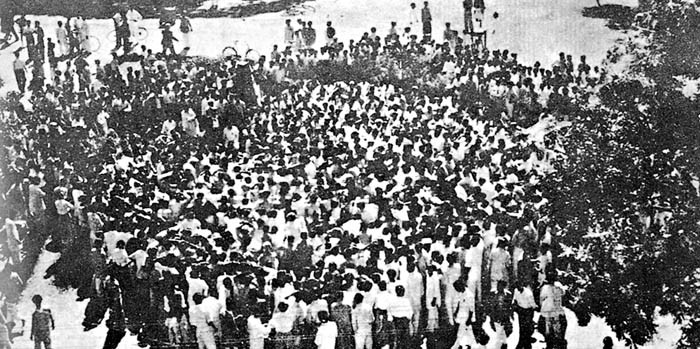
"What should be the national language of Pakistan" has been a perennial question since independence

Pakistan is situated in the Indus valley, which is one of the most ancient civilisations in the world, but many think the country is a victim of identity crisis. The country was the part of India, but most of the people hate to look eastward and here the problem starts. There is still a debate in the academic circles whether we should look eastward or westward or we should have to align ourselves with Arabs and most importantly what should be the national language of Pakistan.
Flashback:
March 21, 1948: Muhammad Ali Jinnah articulately declared in Dhaka that the national language of Pakistan will be Urdu, the language of 100 million Muslims. Jinnah was not only the great leader of Pakistan but also of the Muslim world. The irony was that he did not know very good Urdu but was made to believe by the people around him that Urdu is the only language -- the lingua franca -- to work as a binding force for the new nation in the new country.
February 9, 1951: Sultan Muhammad Shah Aga Khan addresses a session of Motamer al-Alam-al-Islamiyya in Karachi. The visionary leader emphatically calls for Arabic as a national language of Pakistan and it is not too late to understand and implement his message even today. He said, "The language of a nation is not only the expression of its own voice but the mode of interpretation with all other human societies. Before it is too late, I, an old man, implore my brothers in Islam here not to finally decide for Urdu as the national language of Pakistan but to choose Arabic."
February 21, 1952: The people woke up in the morning thunderbolt by seeing that all the road signs in Dhaka were changed overnight from Bengali to Urdu. The people of the new nation had been unprepared to see this kind of folly and unexpected misadventure by the bureaucracy of the time which was dominated by West Pakistanis a few years after the independence. The sentiments -- which were running high on the achievement of a separate homeland for the new nation -- had been evaporated soon after the independence due to voice of dissents and sense of deprivation in every part of the country.
Also read: One country, one language
The move to change the signboards by the leadership of the time met with empathic defiance by academicians, journalists, lawyers, civil society, and social circles in East Pakistan. Some Dhaka University students took out a protest demonstration, but the police perfunctorily handled the matter. In their bid to suppress the demonstration, the police resorted to direct firing, killing three students and injuring hundreds of others.
New phenomenon:
It was a phenomenon of the post-World War II when two unique states appeared on the world map -- Pakistan and Israel -- with many similarities and contradictions. Both were new nations and both had to start from scratches. After more than 60 years of journey, Israel is a vibrant economy with $37,035per capita. Pakistan is the fifth most populous country in the world reeling under $1,200 as the per capita income.
Both Pakistan and Israel were new nations and both had to develop new institutions and a unified language, culture, and traditions. Pakistan comprised several different units with unique languages, cultures, traditions, and lifestyles and all the contradictory units had to live together as a one nation. Israel comprised immigrants from Jewish diaspora all over the world and had to live together as one a nation in one state.
They developed a common language to bring about a common culture. Hebrew was a dead language until 1948 and now it is the language of one of the most developed nations of the world. Pakistani leadership made a mistake from inception by putting all the eggs of nation-building in one basket by choosing Urdu as a national language. Religion is the most important ideology for an individual, but language lives deep inside one’s heart. The nation is beating about the bush since independence about who advised Jinnah to declare Urdu as a national language of Pakistan.
Every language is a respected language, but you should not impose your language on others and do not allow others to impose their language on you. A wrong decision at the local level in Dhaka changed the history of the region and the country, which was the largest Islamic nation in the world, but divided into two in the name of language.
Lessons not learnt:
The National Assembly’s Standing Committee on Law and Justice has rejected a bill seeking status of national language for the regional languages. The members of the committee rejected the bill with a majority vote after a Law Ministry official opposed the bill on the ground that it will further polarise the nation and undermine Urdu language. The bill called for granting the status of national language to regional languages. Marvi Memon had moved the Constitutional Amendment Bill 2014 in February along with nine other PML-N members asking to substitute Article 251 of the Constitution which presently declares Urdu as the national language.
It was suggested in the bill to grant the status of national languages to Balochi, Balti, Brahvi, Punjabi, Pashto, Shina, Sindhi, Seraiki, Hindko, and Urdu; and "all those mother tongues as deemed to be major mother tongues of Pakistan by the National Language Commission". The bill also called upon the government to set up a National Language Commission with a purpose to develop criteria for giving the status of national languages to mother tongues being spoken in the country.
Sardar Amjad Farooq Khosa, a PML-N MNA from Dera Ghazi Khan, was the only member who voted for the bill. A Sindhi PPP MNA Ayaz Soomro and the Jamiat Ulema-e-Islam-Fazl and the Pakistan Tehreek-e-Insaf also opposed the bill whereas the MQM abstained from the vote. No member of the committee was Urdu-speaking.